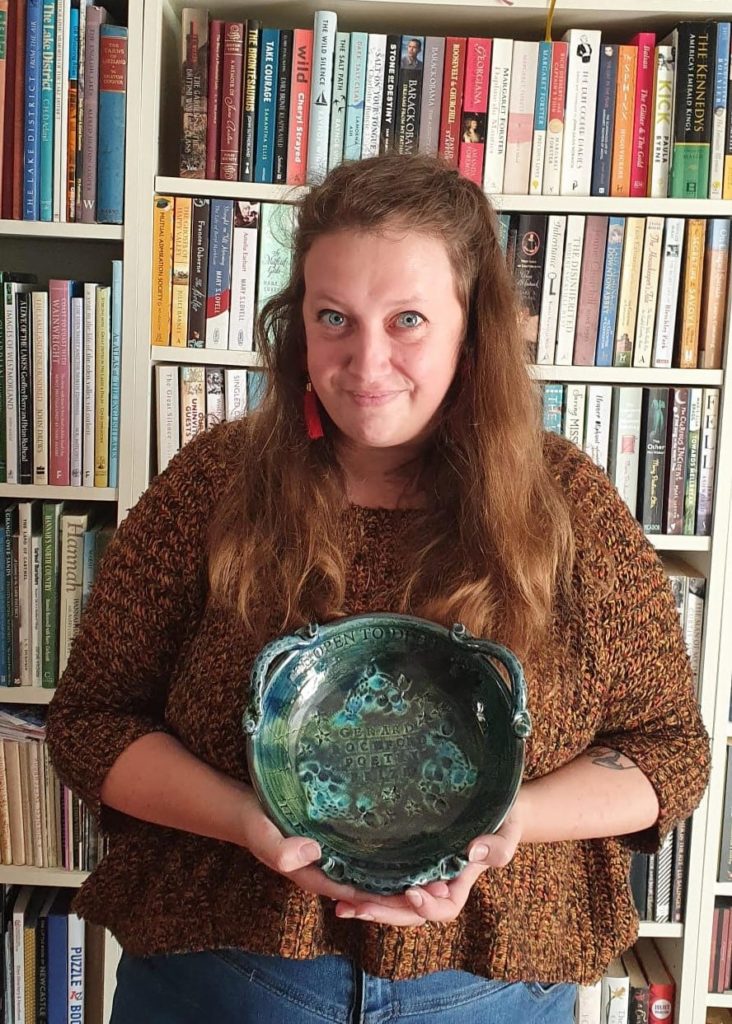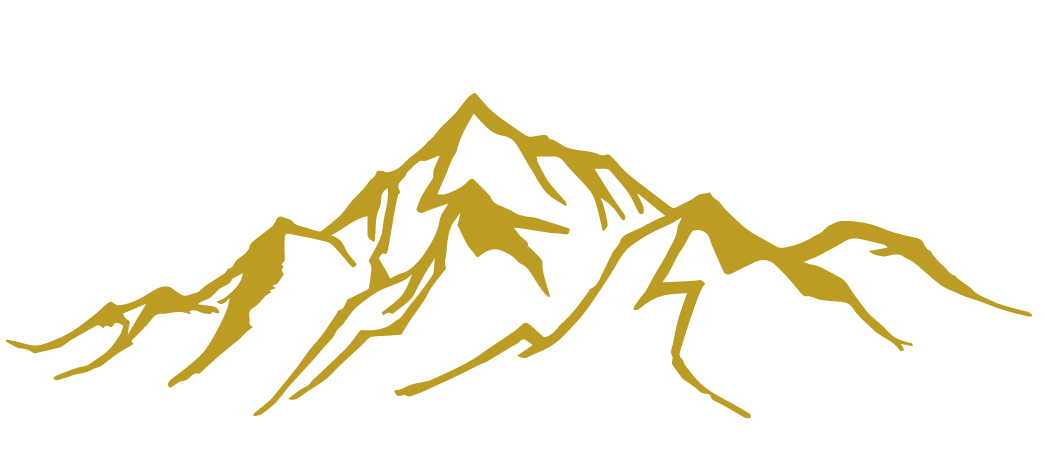
MIST AND MOUNTAIN CREATIVE RESIDENCY & Gerard Rochford Poetry are delighted to share these words and photograph with you from Winner Claire Askew.
‘It is a great honour to have won the Gerard Rochford Poetry Prize 2021 – I’m very grateful to Dr Wayne Price for his belief in my poem and for his kind comments about it. The poem is about ageing and climate change, but at its heart, it is a poem about walking with my mother, an activity that literally held my world together through the fear and anxiety of 2020. The words on the commemorative plate — be open to diversity / it is the river of peace — feel so poignant and so necessary in these times. I am deeply privileged to have some of Gerard’s lines with me always.’
Claire Askew
POET CLAIRE ASKEW WINS THE GERARD ROCHFORD POETRY PRIZE 2021
Poet and novelist, Claire Askew (35) from Carlisle, Cumbria has won the Gerard Rochford Poetry Prize 2021 with her poem, Wetheral.
Established in memory of distinguished Aberdeen poet Gerard Rochford, the Gerard Rochford Poetry Prize 2021 – organised by the Mist and Mountain Creative Residency in collaboration with Rochford’s Literary Executors – invited writers worldwide to submit an original poem on the theme of ‘Family’. With entries from Australia to Zambia, the inaugural competition attracted 736 entries from more than 40 countries.
Dr Wayne Price, Senior Lecturer in Creative Writing at the University of Aberdeen – who selected the winners from the final shortlist – said: “It has been a huge honour to judge the Gerard Rochford Poetry Prize 2021. I’m sure Gerard would have been delighted with the wonderful standard of entries. The shortlisted poems were a pleasure and privilege to read, re-read and think deeply about. I thought there were several on the shortlist that might easily make the final three.
“But, after revisiting each poem many times, I selected a winner and two runners-up that kept revealing new subtleties to me. In particular, I came back time and again to the carefully paced and precisely observed poem, Wetheral.”
Ms Askew wins £150 and a large, bespoke commemorative plate, courtesy of Campbeltown Pottery, featuring an excerpt of Gerard Rochford’s poetry.
Two runners up – Rob McGuire, with his poem Another Job and Knotbrook Taylor for Plato’s Republic – each receive small commemorative plates and £50.
A further nine poems were highly commended by Dr Wayne Price:
Chest – Michaela Coplen
Slipstream – John Paul Davies
The Lonesome Cowboys – Owen Gallagher
Sixteen – Anita John
Waiting Stag – Sarah Leavesley
The Spaces We Don’t Occupy – Nikita Parik
Doing Family – Samantha Samakande
Inishbofin – Michael Shann
Birdwatching With My Father – Cindy Vincent
Brought up in Worcestershire, Gerard Rochford(1932 – 2019) lived most of his life in his adopted home city Aberdeen, where he was a distinguished professor and psychotherapist. Poetry was his true vocation and he was widely published in newspapers, influential online magazines, chapbooks and poetry collections. At the heart of Aberdeen’s vibrant poetry scene, Gerard was highly respected, not only for the quality of his own work, but for his generosity of spirit and time, mentoring and championing the work of nascent poets.
Claire Askew’s winning poem, Wetheral and runners up, Rob McGuire and Knotbrook Taylor’s poems can be read in full online at Mist and Mountain Creative Residency and Gerard Rochford Poetry. Details of the next Gerard Rochford Poetry Prize will be announced in due course.
Further information:
Martin Shannon, Gerard Rochford Poetry Prize 2021
Email: gerardrochfordpoetry@gmail.com
Nabin K. Chhetri, Director Mist and Mountain Creative Residency
Email: contact.mistandmountain@gmail.com
______________________________________________________________________________
THE GERARD ROCHFORD POETRY PRIZE 2021
Judges notes and poets’ short biographies and portraits

CLAIRE ASKEW [Picture credit: Dominic Stevenson]
Winner: Wetheral by Claire Askew
Wetheral
We’re walking the village with August
turning brown: bulbs of honeysuckle
spilling their filaments, summer’s fairylights
clawed from trees. My mother’s giving me
a garden tour: naming the known plants,
closing her hand around rosemary
to wear a bangle of its smell. She looks small,
ducking under buddleia, shrunk somehow
in its violet blacklight as we wonder aloud
if the butterflies are dead – the quiet thistles
listening, birds’ nests kicked out of the hedges.
I don’t get these gardens: these fed lawns
with beds of hydrangea, pansies the colour
of headache, sun-faded gnomes.
Like poems, shouldn’t what’s grown
be useful? Beyond the ditch the wind combs
the dock: there’s chickweed living rough,
the tollpath dandelion trolling its clocks,
though it was Round-Upped
only weeks ago. My mother opens her hand,
so I can smell her ghost of rosemary.
It’s gone, like the best of this long year,
but I don’t say. Let her put her hand
to my face so later, when everything
begins to die, I can remember a garden
did grow here once, and my mother loved it:
enough to bring me here.
Enough to teach me all its names.
Claire Askew
Dr Wayne Price said: Over many days of reading, reflecting and comparing, I came back time and again to this carefully paced and precisely observed poem. There are excellent verb-choices throughout (‘spilling their filaments’, ‘trolling its clocks’), holding the feeling of continual process/change in a poignant tension with the looming stillness and finality of mortality and loss. The imagery is sometimes synaesthetic, sometimes painterly, but never obtrusive. The expert use of assonance and caesura was a real highlight for me and did much to elevate this quiet meditation on love and loss above the many other fine poems in the competition that dealt with similar themes. Moving and delicate lyricism, and a worthy winner.”
Claire Askew – short biography
Claire Askew’s books include the creative writing guide Novelista (John Murray, 2020), the multi-award winning novel All The Hidden Truths (Hodder & Stoughton, 2018), and two poetry collections, both from Bloodaxe Books. This changes things (2016) was shortlisted for numerous awards, including an Edwin Morgan Poetry Award, and How to burn a woman is forthcoming in October 2021. Claire holds a PhD in Creative Writing from the University of Edinburgh, and has been a Scottish Book Trust Reading Champion, a Jessie Kesson Fellow and the University of Edinburgh’s Writer in Residence.
______________________________________________________________________________

Rob McGuire
Another Job
he keeps his head buried
under the sink
hands reaching
in sightless confidence
for the tools he has prepared
as he works he whistles
far-off fragments
of a tune I do not recognise
and mutters the forbidden words
as if I am not there
job done he reappears
his talk of torque and
five-eighth inches
a guileless provocation
from his promised land
and then he stands
(so straight and painless)
and from that height
all that he must see of me
is very little
the back of my head
buried in my own land
my trepidation a rejection
of some sacred pact
I don’t remember making
calloused hands
distant anger
and his heartbreak
over something
he can’t mend
Rob McGuire
Runner Up: Another Job by Rob McGuire
Dr Wayne Price said: “Many strong poems in my final shortlist dealt with themes of memory, familial love and loss. This poem, rather than evoking such rich material directly hides its emotional force behind the deceptively simple narrative of a plumber fixing kitchen pipes. I like the risk that the poet takes in concealing a private weight of unresolved feeling behind an almost comically quotidian screen (much as the essential but unsightly tangle of pipes and sumps stays hidden behind a surface of appliances and cupboard doors). Only at the end does the workaday task of mending pipes become aligned with the much more private, mysterious and perhaps unmendable ‘sacred pacts’ of a broken human heart.”
Rob McGuire – short biography
Underemployed philosopher, dedicated over-thinker, and one-time Buddhist monk, Rob McGuire is trying his best to make sense of things. He lives in Glasgow, and lately he has been writing and sharing some poetry. ______________________________________________________________________________

Knotbrook Taylor
Plato’s Republic I was 16; they were on holiday. I stayed back because I had a part-time job. The phone rang; a woman’s voice; hello Timothy I’m your father’s lover. Six words to split my world. Six words to usher me into a bigger, stranger, place. Six words, my curiosity; I couldn’t hold it back. It was summer, raining. The lime trees were shaking on Augustus Road; sticky goo dripping onto the cars below. Said she was coming round; me saying okay. Said she was my father’s secretary. What a teenage boy envisions, is nowhere near the truth. Older and a little drunk, she wanted me to get in her car. Foolishly; I did. Drove me to a house in Quinton; where she lived with her daughter. There was another woman in that alien lounge who, also, knew the whole story. A story I didn’t know; a story of my frigid mother, who wouldn’t take her nightie off. The daughter, ages with me, said; isn’t this weird? Said I wanted to leave. That I should not be part of this; it was too much information, never call me again! I took a juddering bus-ride home. When they came back from Wales, took him aside. Said, I know what’s going on and it’s your business. A child knows his mother; thinks he does. A child understands his father; thinks he does. In the handling, boy becomes a man; (thinks he does). Just don’t hurt my mother; the best I could muster. I was never troubled again; though sometimes at night the phone would ring; my father eager to answer. After that, he and I, were different. When he was dying, he said; there’s a photograph in Plato’s Republic, in my study. It was of him smiling, in a forest; wearing his check suit and tie. He looked happy; looked the best he could be. Keep it away from your mother; he said, in six words. Please destroy it; (another three).
Runner Up: Plato’s Republic by Knotbrook Taylor
Dr Wayne Price said: “A dynamic, tricky (and skilfully handled) balancing act that sweeps the reader into a queasy collage of dislocating atmospheres and events: wet, ‘sticky’ summer, an invasive revelation, hurt and bewildered voices and feelings, still-raw memory. I think Gerard would have very much liked this poem’s unsentimental yet quietly troubled delivery: it has awkward, resolutely un-lyrical angles to it, but the sharp angles and moments of prosaic abruptness are completely appropriate, direct and convincing. It has its own idiosyncratic force and character and lingers in the memory.”
Knotbrook Taylor – short biography
Knotbrook Taylor is an Angus based poet. Member of the Blue Salt Collective. His first chapbook ‘Beatitudes’ was published in 2007. The Museum of Scottish Lighthouses in Fraserburgh commissioned his second collection ‘Scottish Lighthouse Poems’ which was published in 2011 and explored the rich history and arcane knowledge related to lighthouses in Scotland. It is available from the Museum of Scottish Lighthouses. In 2014 he won the Erbacce prize for his collection ‘Ping-Pong In The Rain’. A book which explores the juxtaposition of random ideas within a poem and finds connections. It includes themes exploring love, death and the film Bladerunner.
______________________________________________________________________________
Claire Askew’s winning poem, Wetheral and runners up, Rob McGuire and Knotbrook Taylor’s poems can be read in full online at Mist and Mountain Creative Residency and Gerard Rochford Poetry.
Mist and Mountain Creative Residency Facebook link Press here:
Gerard Rochford Poetry Facebook Link Press here:

ENTRY RULES:
1. The Gerard Rochford Poetry Prize 2021 is an international poetry competition open to any writer over the age of 18.
2. Entry is FREE but limited to one poem per individual entrant.
3. The theme for the competition is ‘Family’.
4. All entries must be in English.
5. Poems can be any length up to a maximum of 40 lines.
6. Poems must be titled and entirely the original, unpublished work of the entrant.
7. Submissions must be entered under the entrant’s real name.
8. No relatives of the Gerard Rochford Prize 2021 judging committee are eligible to enter this competition.
9. Copyright of all poems remains with the entrants but the winning three poets hereby grant the competition organisers the right to publish their winning entries online.
10. The closing date for entries is midnight (UK time) Wednesday 30 June 2021.
11. Mist and Mountain Creative Residency and Gerard Rochford’s Literary Executors will shortlist entries for final judging.
12. Dr Wayne Price, Senior Lecturer in English Literature and Creative Writing at the University of Aberdeen will select the winner and runners up from the shortlist.
13. The judges’ decision is final and competition organisers are unable to comment on individual entries.
14. The winner and runners up will be announced on Wednesday 1 September 2021 and see their poems published on the Mist and Mountain Creative Residency website and the Gerard Rochford Poetry page.
16. First Prize is £150 and a large, bespoke commemorative plate, courtesy of Campbeltown Pottery, featuring an excerpt of Gerard Rochford’s poetry.
17. Two runners up will each receive £50 and a small, bespoke commemorative plate, courtesy of Campbeltown Pottery, featuring an excerpt of Gerard Rochford’s poetry.
18. All entries – including the author’s real name and contact details – must be submitted electronically via both the following email addresses:
gerardrochfordpoetry@mail.com
gerardrochfordpoetry@gmail.com
We look forward to reading your submissions.
Thank you.
Gerard Rochford – Biography
Gerard Rochford (17 December 1932 – 18 December 2019) was brought up in Worcestershire, England, educated at Hull and Oxford Universities but lived most of his life in Aberdeen, Scotland.
A distinguished professor and psychotherapist, poetry was a lifetime’s vocation. Gerard’s poetry was widely published throughout his lifetime; from student newspapers to influential online magazines and many of his own chapbooks and collections. His extensive writings explored human relationships, wildlife and politics. ‘Perhaps they are all one’, he said.
At the heart of Aberdeen’s vibrant poetry scene, Gerard was the co-founder and leading light of the city’s poetry group which still thrives today, holding monthly poetry evenings at arts café, Books and Beans. Gerard was highly respected in the group, not only for the quality of his own work, but for his generosity of spirit and time, mentoring, editing and championing the work of nascent poets. A regular visitor to Canada, he established himself as a transatlantic poet and became an important and active part of the poetry scene in Victoria.
As Makar for the respected online magazine Scottish Review, Gerard submitted a poem every month for over five years. His poem My Father’s Hand was chosen by the Scottish Poetry Library as one of the best poems of 2006.
Gerard lived in the west end of Aberdeen from 1963 until he died in 2019. Well travelled and well read, he had an exceptionally broad hinterland to draw inspiration from for his work. Poetry was a lifetime labour of love but as father of ten children with his Anglo-Indian wife Anne (d.1991), Gerard’s greatest joy was his family.
Select Publications
DNA – Poems for a Family – foreword by Morelle Smith.
Cairn – Poems for the Isle of Lewis – foreword by Robert Macfarlane.
Failing Light – handcrafted limited edition from the same handpress used by Ted Hughes.
Of Love and Water – a collaboration with Canadian artist David Ladmore.
Morning Crossword – a collaboration with Scottish artist Esther Green.
